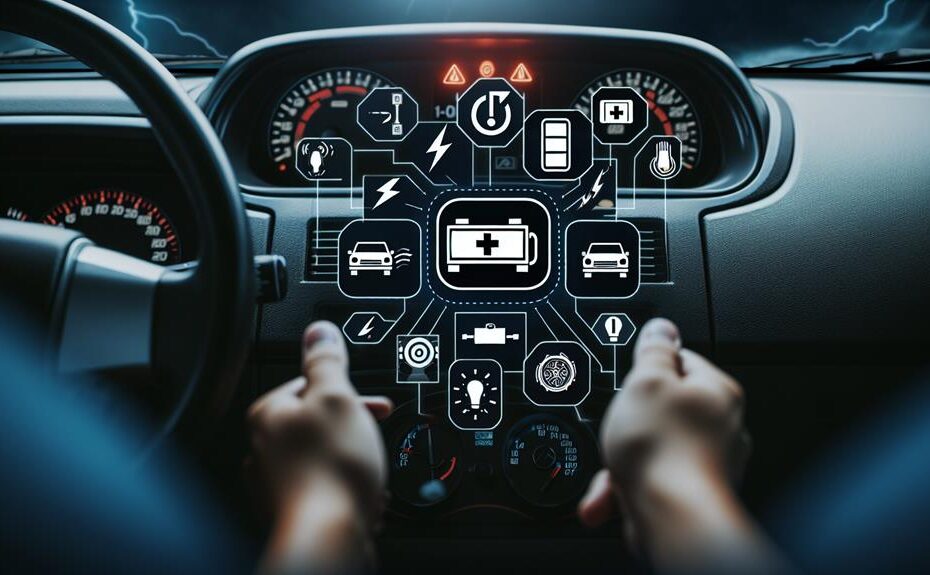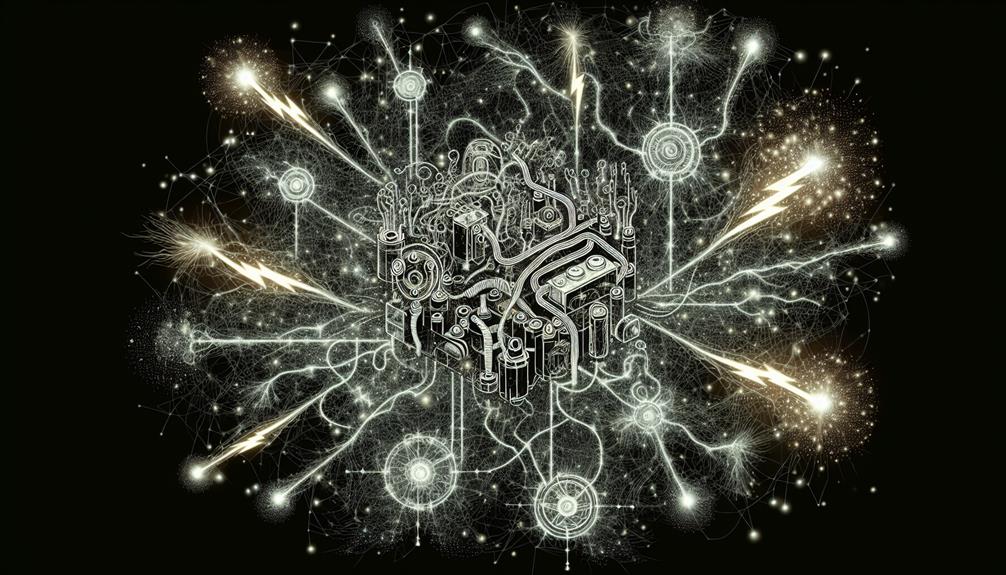Picture this: you're driving down the road on a dark, stormy night, relying on your car's headlights to guide you through the rain. Suddenly, they start flickering, dimming, and struggling to stay on. You can't help but feel a sense of unease, as if your car is trying to tell you something. Well, it just might be.
Your car's electrical system is like the nervous system of your vehicle, and when it starts acting up, it's crucial to pay attention. In this discussion, we will explore the 8 best warning signs that indicate your car's electrical system may be in need of repair.
So buckle up and get ready to uncover the mysteries behind those flickering lights and unresponsive components, because what you discover could save you from a potential breakdown on the side of the road.
Key Takeaways
- Flickering or dimming lights, unresponsive electrical components, and strange burning smells are common signs of electrical system issues in a car.
- Malfunctioning dashboard indicators can make it difficult to monitor vehicle performance, so it is important to promptly address any issues.
- Consulting a professional mechanic who specializes in car electrical system repair is recommended for troubleshooting and fixing electrical problems accurately.
- Weak or dead batteries, faulty starter motors, and faulty ignition switches are common causes of difficulty starting a car.
Flickering or Dimming Lights
If you notice your car's lights flickering or dimming while driving, it's important to address this issue promptly as it could be a sign of a potential electrical problem. Flickering lights or dimming headlights are commonly caused by a faulty alternator or a weak battery.
Your car's electrical system relies on the alternator to generate power and recharge the battery while the engine is running. If the alternator isn't functioning properly, it may not be able to provide a consistent flow of electricity to the lights, causing them to flicker or dim. Similarly, if the battery is weak or nearing the end of its lifespan, it may not have enough power to sustain the lights at their full brightness.
In either case, it's crucial to have your car inspected by a qualified mechanic to diagnose and rectify the issue. Ignoring the problem could lead to further complications, such as a dead battery or complete electrical failure while driving.
Unresponsive Electrical Components
Unresponsive electrical components in your car can indicate a potential issue with the electrical system. When your car's electrical components, such as the radio, power windows, or dashboard lights, fail to respond or work intermittently, it's crucial to address the problem promptly.
One possible cause of unresponsive electrical components is loose connections. Over time, the electrical connections in your car can become loose due to vibrations or age. These loose connections can disrupt the flow of electricity and prevent the components from functioning properly.
Additionally, unresponsive electrical components can also be a result of electrical sparks. Electrical sparks occur when there's a faulty connection or a short circuit in the system. These sparks can damage the electrical components and cause them to malfunction.
If you notice any unresponsive electrical components in your car, it's essential to have your electrical system inspected by a qualified technician. They can identify the underlying issue, such as loose connections or electrical sparks, and perform the necessary repairs to ensure the proper functioning of your car's electrical system.
Strange Burning Smell
When you detect a strange burning smell in your car, it's important to address the issue promptly to ensure the safety and proper functioning of your vehicle's electrical system. This smell may indicate overheating wires or the presence of electrical smoke, both of which can be dangerous if left unattended.
Here are the warning signs to look out for:
- Burning odor: If you notice a strong, acrid smell resembling burning plastic or rubber, it's likely coming from your car's electrical system. This could be a sign of overheating wires or components.
- Smoke: If you see or smell smoke coming from your car's dashboard, engine compartment, or any other area, it's crucial to pull over immediately and turn off the engine. Electrical smoke can be a sign of a serious and potentially hazardous problem.
- Flickering lights: If your headlights, interior lights, or dashboard lights are flickering or dimming, it could indicate a fault in the electrical system. This shouldn't be ignored, as it may lead to further issues.
- Electrical malfunctions: If you experience unexplained electrical malfunctions, such as power windows or locks not working, or the radio or air conditioning system behaving erratically, it could be a symptom of an underlying electrical issue.
Frequent Blown Fuses
Frequent blown fuses can indicate underlying issues in your car's electrical system. When a fuse blows, it means that there's an excessive amount of electrical current flowing through the circuit. This can be caused by a variety of factors, and it's important to identify and address the root cause to prevent further damage to your vehicle.
One common cause of blown fuses is a short circuit. This occurs when a wire in the circuit comes into contact with a ground point or another wire, causing the current to bypass the intended path. To troubleshoot this issue, start by inspecting the wires for any signs of damage or fraying. If you find any, replace the damaged wires.
Another possible cause of blown fuses is an overloaded circuit. This happens when the circuit is trying to handle more electrical current than it can safely handle. To troubleshoot this issue, check if any aftermarket accessories have been added to the circuit recently. If there are any, remove them and see if the issue persists.
In some cases, blown fuses may also be caused by faulty electrical components, such as a malfunctioning relay or a defective switch. To troubleshoot this, you'll need to use a multimeter to test the components and ensure they're functioning properly.
Battery Draining Quickly
If your car's battery is draining quickly, it may indicate an underlying issue with your vehicle's electrical system. This can be a frustrating problem to deal with, as it can leave you stranded and in need of a car battery replacement. However, understanding the potential causes of a quickly draining battery can help you diagnose and resolve the issue more effectively.
Here are some possible reasons why your car's battery is draining quickly:
- Faulty alternator: A malfunctioning alternator may not be charging your battery properly, causing it to drain quickly.
- Parasitic draw: Certain electrical components, like a faulty relay or a malfunctioning module, can draw power from your battery even when the car is turned off.
- Loose or corroded battery connections: Loose or corroded battery connections can prevent the battery from charging properly and cause it to drain quickly.
- Old battery: Over time, car batteries lose their ability to hold a charge, leading to quick drainage.
To prevent a quickly draining battery, it's important to perform regular electrical system maintenance. This includes checking and tightening battery connections, inspecting the alternator for any signs of malfunction, and replacing the battery when necessary. By staying proactive and addressing any electrical system issues promptly, you can avoid the inconvenience and expense of a battery replacement.
Malfunctioning Dashboard Indicators
If your car's battery is draining quickly, another potential issue with your vehicle's electrical system to be aware of is malfunctioning dashboard indicators. Dashboard indicator problems can be a result of various electrical issues in your car. These indicators are crucial for providing important information about the health and status of your vehicle. When they malfunction, it can be difficult to diagnose and troubleshoot electrical issues.
Here are some common dashboard indicator problems and their possible causes:
| Indicator Problem | Possible Cause |
|---|---|
| Indicator lights not working | Blown fuse or a faulty connection |
| Erratic or flickering lights | Loose or damaged wiring |
| Dim or weak indicator lights | Low battery or a faulty alternator |
If you are experiencing any of these issues, it is important to address them promptly. Malfunctioning dashboard indicators can make it challenging to monitor your vehicle's performance and identify potential problems. To troubleshoot electrical issues related to dashboard indicators, it is recommended to consult a professional mechanic who specializes in car electrical system repair. They have the expertise and equipment to diagnose and fix the problem accurately. Remember, a well-functioning electrical system is essential for the overall performance and safety of your vehicle.
Difficulty Starting the Car
When experiencing difficulty starting your car, there are several potential electrical system issues that could be the cause. It's important to identify these issues and troubleshoot them accordingly. Here are some common causes and troubleshooting tips to help you address the problem:
- Weak battery: A weak or dead battery is one of the primary reasons for difficulty starting the car. Check the battery voltage using a multimeter, and if it's below 12.4 volts, recharge or replace the battery.
- Faulty starter motor: A malfunctioning starter motor can prevent the car from starting. Listen for a clicking sound when turning the key, indicating a faulty starter motor. In this case, it may need to be repaired or replaced.
- Ignition switch problems: A faulty ignition switch can disrupt the electrical connection and prevent the car from starting. Try jiggling the key or using a spare key to see if it solves the issue. If not, the ignition switch may need to be replaced.
- Wiring issues: Damaged or loose wiring connections can cause intermittent starting problems. Inspect the wiring harnesses for any visible damage or loose connections. If necessary, repair or replace the affected wiring.
Random Electrical Glitches
You may experience unexpected power surges or intermittent electrical failures in your car, which are commonly known as random electrical glitches.
These glitches can cause various issues, such as sudden changes in the brightness of your headlights, flickering dashboard lights, or even the malfunctioning of certain electrical components.
It's important to address these glitches promptly as they can indicate underlying problems in your car's electrical system that may worsen if left unattended.
Unexpected Power Surges
Unexpected power surges, also known as random electrical glitches, can be a cause for concern in your car's electrical system. These power instabilities can indicate underlying issues that require immediate attention. Here are some warning signs to watch out for:
- Flickering lights: If your headlights or interior lights flicker or dim while driving, it could be a sign of electrical surges.
- Unresponsive electronics: When your car's electronic components, such as the radio or power windows, start malfunctioning or become unresponsive, it may be due to power fluctuations.
- Engine stalling: Power surges can disrupt the engine's performance, causing it to stall unexpectedly.
- Battery problems: If your battery is draining quickly or not holding a charge, it may be a result of electrical surges.
If you experience any of these issues, it's important to have your car's electrical system inspected by a professional to prevent further damage and ensure your safety on the road.
Intermittent Electrical Failures
If your car is experiencing power surges, it's important to be aware of another potential issue that can arise in the form of intermittent electrical failures, also known as random electrical glitches. These failures can be frustrating and unpredictable, causing various electrical components in your car to malfunction or stop working altogether.
Common causes of intermittent electrical failures include loose or corroded connections, faulty wiring, and failing electrical components such as relays or switches. Troubleshooting techniques for these issues can include checking and tightening all electrical connections, inspecting the wiring for any signs of damage or wear, and testing the electrical components with a multimeter to ensure they're functioning properly.
It's crucial to address these issues promptly as they can lead to more severe electrical problems if left unresolved.
Frequently Asked Questions
How Long Does It Usually Take to Repair a Car's Electrical System?
It usually takes a few hours to repair a car's electrical system, depending on the complexity of the issue. Signs of car electrical system failure include dimming lights, flickering dashboard, and difficulty starting the engine.
Can I Continue Driving My Car if I Notice Flickering or Dimming Lights?
Driving with flickering or dimming lights can be dangerous and may indicate a problem with your car's electrical system. It's advisable to get it checked by a professional to ensure your safety on the road.
What Could Be the Possible Causes of a Burning Smell in My Car?
If you notice a burning smell in your car, it could be caused by a variety of issues. Troubleshooting is necessary to determine the exact cause, such as an overheating engine, electrical wiring problems, or a malfunctioning component.
Are There Any DIY Solutions for Fixing Frequent Blown Fuses?
If you're experiencing frequent blown fuses, there are DIY solutions and troubleshooting techniques you can try. Start by checking for any faulty wiring, loose connections, or damaged components. Be cautious and consult a professional if needed.
Is It Possible for a Malfunctioning Dashboard Indicator to Affect the Overall Performance of the Car?
If your malfunctioning indicator lights are affecting the overall performance of your car, it is possible that there is an underlying issue with the car's electrical system. It is recommended to have it inspected by a professional.
Conclusion
In conclusion, recognizing the warning signs of car electrical system repair is crucial for maintaining the safety and functionality of your vehicle.
While some may argue that these signs can be easily overlooked or mistaken for minor issues, it's important to remember that ignoring these indicators can lead to more serious and costly problems down the line.
By addressing these issues promptly and seeking professional assistance, you can ensure a smooth and reliable driving experience.
- How to Easily Turn off Interior Lights in Volkswagen Tiguan 2021 - May 12, 2024
- How to Easily Defog Windshield Without AC: Quick Solutions - May 12, 2024
- How Big is 1.2 Cubic Feet: The Ultimate Guide to Measuring Volume - May 12, 2024



